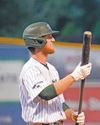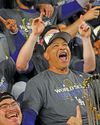
Even if you go to minor league baseball games every year, it's easy to miss the subtle changes that have occurred over the span of a couple of decades.
Some differences aren't very subtle. The arrival of a pitch clock at Triple-A in 2015 was hard to miss. The reduction of the ticket-taking, affiliated minor leagues from 160 to 120 teams was a seismic change.
A lot of other changes are a little less apparent. One year's bleachers become next year's party deck. A "bark in the park" joins the promotional schedule.
Any one of these moves is very minor, but they are the tweaks that over the years that transform the experience for players, teams and fans.
Here's a look at 10 ways the minor leagues have changed and will change over the next few years.
1. MINOR LEAGUE BASEBALL OWNERSHIP IS CONSOLIDATING
The days of the mom and pop-owned minor league team largely disappeared in the 1990s, replaced by the wealthy owner or ownership group. For the owners who survived the threadbare days of the 1970s and '80s, the chance to sell at greatly increased valuations made it a logical time to get out.
Now, we are seeing another transformation. As part of MLB's takeover of the minor leagues, previous rules that prevented a single ownership group from owning more than one team in any league were eliminated.
That opened the doors for consolidation in a manner that had never been possible. Add the desire for some owners to cash out after losing an entire season to the pandemic in 2020, not to mention the concerns that MLB could push for further reductions in the minors in 2031, and the conditions were set for private equity groups to make big inroads into the minor leagues.
This story is from the April 2023 edition of Baseball America.
Start your 7-day Magzter GOLD free trial to access thousands of curated premium stories, and 9,000+ magazines and newspapers.
Already a subscriber ? Sign In
This story is from the April 2023 edition of Baseball America.
Start your 7-day Magzter GOLD free trial to access thousands of curated premium stories, and 9,000+ magazines and newspapers.
Already a subscriber? Sign In

INDEPENDENT/PARTNER LEAGUES PLAYER OF THE YEAR ADAM FOGEL, MISSOULA PADDLEHEADS
Adam Fogel sets the Pioneer League home run record in a season to remember

MINOR LEAGUE EXECUTIVE OF THE YEAR MIKE ABRAMSON, HARTFORD YARD GOATS
Hartford GM Mike Abramson’s tireless dedication has made the Yard Goats one of the best tickets in the minor leagues

FREITAS AWARD: CLASS A COLUMBIA FIREFLIES
The Columbia Fireflies light the way for a community redevelopment project that benefits an entire city

FREITAS AWARD: DOUBLE-A SOMERSET PATRIOTS
From indy ball to affiliated, Somerset continues its tradition of excellence in fruitful partnership with the Yankees

FREITAS AWARD: TRIPLE-A SACRAMENTO RIVER CATS
Key initiatives and facility upgrades make Sacramento a top minor league attraction and also a natural fit as the Athletics’ home in 2025

MINOR LEAGUE MANAGER OFTHEYEAR ZACH VINCEJ, MODESTO
Zach Vincej led Modesto to back-to-back California League championships with teams brimming with top Mariners talent

MINOR LEAGUE TEAM OF THE YEAR LAKE COUNTY CAPTAINS
The low-payroll Guardians rely on homegrown talent to fuel MLB success. Midwest League-champion Lake County provides optimism for the future.

MLB COACH OF THE YEAR CHRIS FETTER, TIGERS
Chris Fetter applies all the right touches to a Tigers pitching staff that clawed its way toward the top

MLB EXECUTIVE OF THE YEAR MATT ARNOLD, BREWERS
Continuity is the Brewers’ secret weapon. Matt Arnold made sure the 2024 club met expectations

MLB MANAGER OF THE YEAR DAVE ROBERTS, DODGERS
The Dodgers’ Dave Roberts has done things few managers have ever done. Now, he’s finally getting his due.